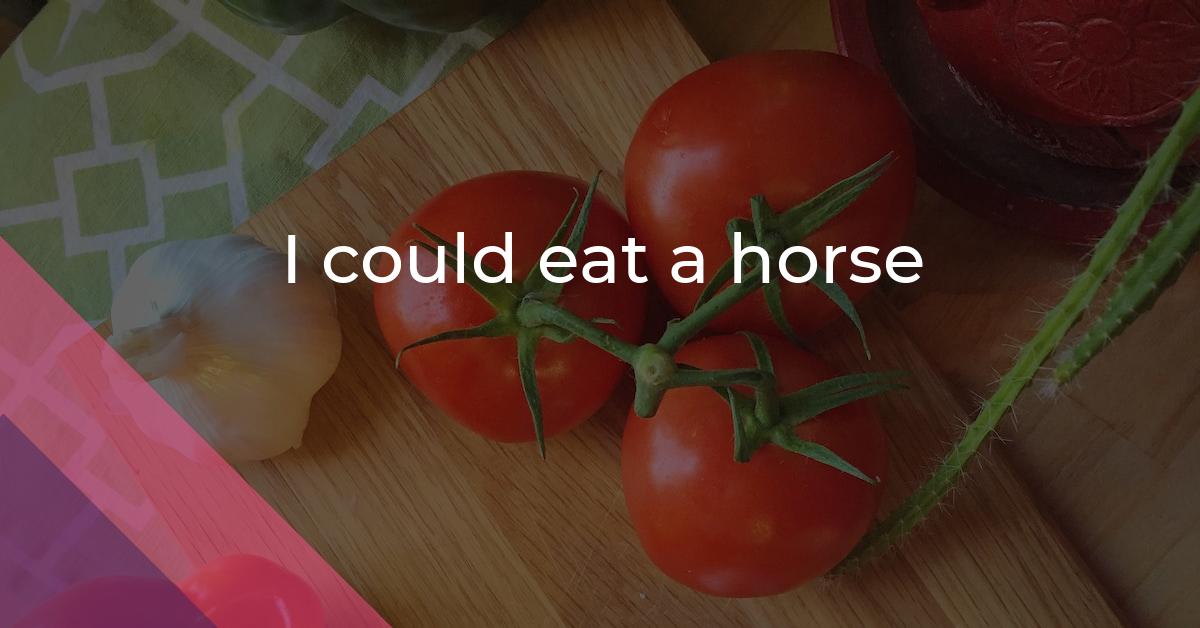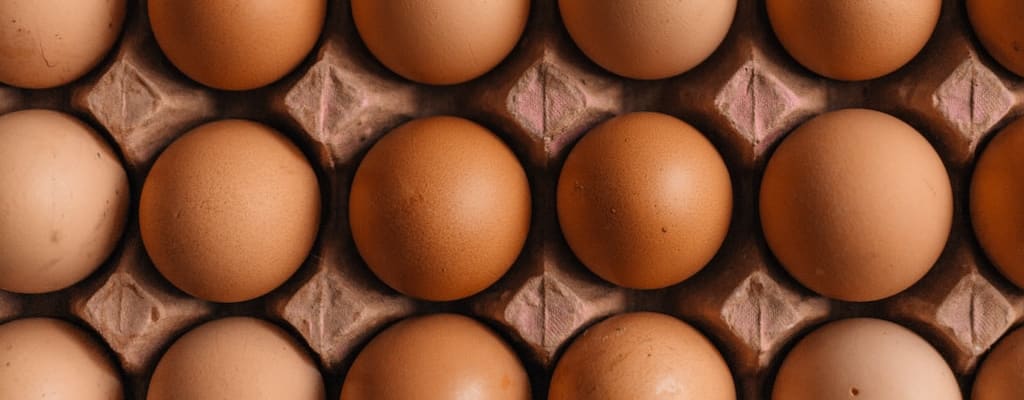I could eat a horse: Idiom Meaning and Origin
What does ‘I could eat a horse’ mean?
The idiom "I could eat a horse" means to be extremely hungry, indicating that one's appetite is so intense that they could consume a large amount of food, even as much as an entire horse.

Idiom Explorer
The idiom "high on the hog" means to live in a luxurious or extravagant manner, enjoying the best of everything. It originates from the idea that the choice cuts of meat, which are considered the best, come from the upper part of the pig.
"High horse" is an idiom that means someone is being arrogant, self-righteous, or condescending. It is often used to criticize someone who acts superior or looks down on others.
The idiom "have eyes bigger than one's stomach" means to take or desire more than one can actually consume or handle.
The idiom "good enough to eat" means something is extremely delicious or attractive, to the point where one might want to consume or devour it.
The idiom "fill one's face" means to eat a large amount of food quickly and greedily.
The idiom "enough to choke a horse" means an excessive amount or quantity that is more than necessary or expected.
The idiomatic expression "eat someone's lunch" means to defeat or outperform them, typically in a competitive or confrontational situation.
"Eat someone out of house and home" means to consume all of someone's food and resources, usually in large quantities. It is used to describe someone who eats voraciously and excessively, causing a significant strain on the household's supplies and finances.
The idiom "eat one's heart out" means to feel intense sadness or jealousy over someone else's success or happiness.
The idiom "eat one's head off" means to consume something excessively or without restraint, often referring to a person or an animal consuming food in large quantities. It emphasizes the idea of extreme or voracious eating.
Voracious Equine Cravings
The idiom "I could eat a horse" is a commonly used expression in the English language. It is often used to convey a strong feeling of hunger or the desire to eat a large amount of food. The idiom suggests that the person is so hungry that they could consume a whole horse, implying an exaggerated sense of appetite.
While the origins of this idiom are not clear, it is believed to have originated in the early 19th century. The earliest known written record of a similar phrase can be traced back to 1839 in a publication called "Memoir and Correspondence of Caroline Herschel," written by Mrs. John Herschel. In the book, she mentions the phrase "I could eat a horse," indicating that it was already in common usage at that time.
The idiom is often used to express not only hunger but also a metaphorical craving for something specific. It can be used in a figurative sense to convey a strong desire or longing for something, beyond just food. For example, someone might say "I could eat a horse for a good night's sleep" to emphasize their desperate need for rest.
Given the exaggerated nature of the phrase, it is typically used in informal contexts or in a lighthearted manner. It is commonly heard in everyday conversations, especially among friends or family members.
The idiom has also been widely used in literature, films, and other forms of popular culture, further solidifying its place in the English language.
One related idiom to "I could eat a horse" is "enough to choke a horse." This idiom is used to describe a large quantity of food that is more than one can consume. It is often used to exaggerate the amount of food that is available or that one is able to eat. For example, someone might say "The buffet had enough food to choke a horse" to emphasize that there was an abundant amount of food.
Another related idiom is "beef to the hoof." This idiom is used to describe someone who is very strong or muscular. It suggests that the person has so much muscle mass that they could be compared to a large, powerful animal like a horse. For example, someone might say "That bodybuilder has beef to the hoof" to emphasize their impressive physical strength.
Yet another related idiom is "eat one's head off." This idiom is used to describe someone who eats a large amount of food or who has a voracious appetite. It suggests that the person consumes food to such an extent that it is as if they are eating their own head. For example, someone might say "My teenage son eats his head off" to indicate that he has a big appetite and eats a lot of food.
Finally, there is the idiom "chow down." This idiom is used to describe the act of eating a meal, often in a casual or enthusiastic manner. It suggests that the person is enjoying their food and eating with gusto. For example, someone might say "Let's chow down on some pizza" to express their excitement about eating pizza.
It is worth noting that while the idiom itself is well-known and understood, the literal meaning of eating a horse is not something that would be condoned or practiced in reality. The idiom serves as a colorful and expressive way to convey one's hunger or desire, but it should not be taken literally.
The idiom "I could eat a horse" is a widely-used expression to express extreme hunger or a strong craving. Its origins can be traced back to the early 19th century, and it has since become an integral part of the English language. While the phrase may seem unusual at first, its figurative meaning is widely understood and has been embraced in various contexts. The idiom continues to be used today, serving as a powerful tool for expression and emphasizing one's desire for something.
Example usage
Examples of how the idiom "I could eat a horse" can be used in a sentence:
- "After the long hike, I am so hungry that I could eat a horse."
- "I am starving! I could eat a horse right now."
- "He's always hungry! He claims he could eat a horse every day."
More "Appetite" idioms
We missed the mark - nothing found.



